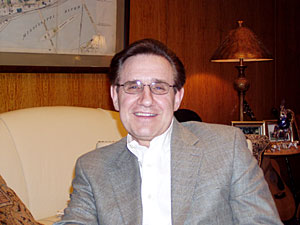|
Audio
Photos
More from MPR
Resources
Your Voice
|
St. Paul delegation visits Hmong refugee camp
February 27, 2004
 |
| St. Paul Mayor Randy Kelly says he wants to help Hmong refugees become productive as quickly as possible. (MPR Photo/Toni Randolph) |
St. Paul, Minn. — About half of the Hmong living in the Wat refugee camp are under the age of 15. Since about 1,600 refugees from the camp are expected to resettle in the Twin Cities, that means roughly 800 new Hmong students could be enrolling in area schools over the next three years. The student population of the St. Paul Public Schools is about 30 percent Hmong, by far the largest ethnic group.
 | |||
Mo Chang is the coordinator of special projects for the St. Paul Public Schools and one of three members of the Twin Cities delegation from the school district traveling to the Wat camp. Chang says she wants to meet with teachers or any other education experts in the camp to determine what the children there are learning.
"We want to know what they teach, what's a typical day, what's the education level in school," says Chang, "so we can bring that back and begin to implement programs to meet the needs of the students in the camp right now."
While Chang will be trying to determine the educational needs of the incoming immigrants, other members of the St. Paul delegation will look at resettlement, health and quality of life issues.
The 18-member delegation is being led by St. Paul Mayor Randy Kelly. St. Paul has the biggest population of Hmong than any other U.S. city, and Kelly says that's why he's embarking on this fact-finding trip to the refugee camp.
|
What I really hope is that they'll be able to bring some good and useful information for us here in the Twin Cities, so we know what to prepare for the new arrivals once they arrive here.
- William Yang, the director of Hmong American Partnership |
"As a political leader, I think it is very important for me to see first-hand the camp and conditions from which people will be coming, so we can have a much better insight and knowledge about the kinds of things that we'll need to do in order to bring them into the mainstream -- and to be as productive as possible as quickly as possible," Kelly says.
The delegation's trip comes only a few months after the U.S. State Department announced that the Hmong refugees living at the camp could resettle in the United States, and just weeks before the State Department begins processing refugees for their eventual immigration to the United States. During their week-long trip, the delegation will meet with Thai government and military officials, as well as with Hmong leaders in the refugee camp.
Members of the Hmong community in St. Paul are pleased that the mayor is visiting the camp -- a facility surrounded by barbed wire and patrolled by the military -- which has no running water. Vone Moua is a mental health care provider in St. Paul.
"I think having a group of individuals who are in the public services traveling with our native Hmong individuals -- I think that in itself brings a lot of relief to people in Thailand in the camp," Moua says.
But Moua has some concerns about the trip. He's worried about whether the mental health needs of the refugees are being assessed. He says some of the Hmong from the first wave of refugees are still dealing with some mental health issues, and he doesn't want this generation to repeat what their predecessors have experienced.
Moua says getting an accurate assessment of the needs of the refugees now will help government agencies and community organizations round up the necessary resources. William Yang, the director of Hmong American Partnership, agrees.
"What I really hope is that they'll be able to bring some good and useful information for us here in the Twin Cities, so we know what to prepare for the new arrivals once they arrive here," Yang says.
The refugees are expected to begin arriving in the Twin Cities in August.
|
News Headlines
|
Related Subjects
|
